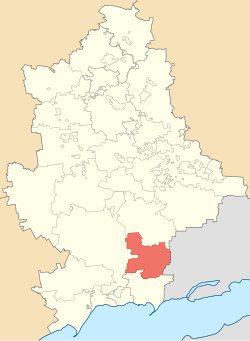Boikivske Raion: Difference between revisions
m Dating maintenance tags: {{Cn}} |
m Andrewa moved page Telmanove Raion to Boikivske Raion over redirect: RM |
(No difference)
| |
Revision as of 20:56, 22 November 2023
A request that this article title be changed to Boikivske Raion is under discussion. Please do not move this article until the discussion is closed. |
Telmanove Raion
Тельманівський район | |
|---|---|
 | |
| Country | |
| Region | Donetsk Oblast |
| Established | 1923 |
| Disestablished | 18 July 2020 |
| Admin. center | Telmanove (de jure) Myrne (de facto)[1][2] |
| Subdivisions | List
|
| Government | |
| • Governor | Olga Afenkina |
| Area | |
• Total | 812.92 km2 (313.87 sq mi) |
| Population (2020) | |
• Total | |
| Time zone | UTC+02:00 (EET) |
| • Summer (DST) | UTC+03:00 (EEST) |
| Postal index | 87100-87182 |
| Area code | +380 6279 |
Telmanove Raion (Template:Lang-uk) or Boikivske Raion (Template:Lang-uk) was one of the administrative raions (a district) of Donetsk Oblast, Ukraine, until 2020. The administrative center of the raion is located in the urban-type settlement of Telmanove, also known as Boikivske. The last estimate of the raion population, reported by the Ukrainian government, was 13,773 (2020 est.).[3]
Since 2014, much of the area of the raion has been controlled by the Donetsk People's Republic (DPR), a Russia-supported breakaway state (later explicitly and illegally annexed by Russia). [4] The raion was officially abolished on 18 July 2020 as part of the administrative reform of Ukraine, which reduced the number of raions of Donetsk Oblast to eight,[5][6] but the DPR has continued using Telmanove Raion as an administrative unit after 2020.[4]
History
The raion was originally formed as Ostheim Raion in late 1934, with Ostheim (now Telmanove) as its center.[7] In 1935, the raion was renamed Telmanove Raion after the German Communist leader Ernst Thälmann.[citation needed]
As the result of the 1951 Polish–Soviet territorial exchange, the Soviet authorities deported and resettled approximately 400 families of Boykos from the village of Chorna (today Czarna in Poland), the former Nyzhni Ustryky Raion of Drohobych Oblast that was transferred to Poland.[citation needed]
On 9 December 2014, the Verkhovna Rada, Ukraine's national parliament, changed the boundaries and total area of Telmanove Raion to encompass 812.92 km2 (313.87 sq mi). The district's administration buildings and government was moved to the Myrne urban-type settlement following the events surrounding the war in Donbas.[1][2]
A small part of the raion on the west bank of the Kalmius river was under Ukrainian army control, from the north city of Starohnativka to the south city of Mykolaivka. To facilitate the administration, the government transferred this area to other administrative units, so that the amended area of the raion until 2020 was under control of the Donetsk People's Republic.[citation needed]
In 2016, Ukraine's national parliament, the Verkhovna Rada, renamed Telmanove Raion into Boikivske Raion and Telmanove to Boikivske,[citation needed] in commemoration of the Boykos people, who were deported from Czarna, Bieszczady County (today in Poland) after the 1951 Polish–Soviet territorial exchange. The Donetsk People's Republic continues to recognize the old name.[citation needed]
Geography
Telmanove Raion bordered Novoazovsk Raion to its south, Nikolske Raion to its southwest, Volnovakha Raion to its west, Starobesheve Raion to its north. From the east, the raion is bounded by the international Russia–Ukraine border.
Administrative divisions
The district is divided into three settlement councils and twelve rural councils.
Demographics
According to the 2001 Ukrainian Census:[8]
| Ethnicity | ||
| Ukrainians | 20,442 | 57.8% |
| Russians | 7,359 | 20.8% |
| Greeks (Urums) | 6,172 | 17.5% |
| Tatars | 623 | 1.8% |
| Belarusians | 165 | 0.5% |
| Germans | 152 | 0.4% |
Note: Urums are Turkic speaking Greeks. Many of them were deported here with[citation needed] the First annexation of Crimea by the Russian Empire (1784) from Balaklava, on the Crimean Peninsula, once a cultural center for Pontic Greeks (see also Mariupol Greek).
Gallery
-
Monument in Konkove (25th Anniversary of Donbas liberation from Nazi invaders)
-
Landscape of the Kalmius Reserve
-
Kalmius River at the Kalmius Reserve
References
- ^ a b Laws of Ukraine. Verkhovna Rada of Ukraine No. 32-VIII: Про зміни в адміністративно-територіальному устрої Донецької області, зміну і встановлення меж Волноваського, Новоазовського та Тельманівського районів Донецької області (On the changes in the administrative and territorial structure of Donetsk Oblast, changing and defining the boundaries of the Volnovakha, Novoazovsk and Telmanove Raions of Donetsk Oblast). Adopted on 11 December 2014. (Ukrainian)
- ^ a b "In the Donetsk Oblast three district centers removed from the territory seized by militants". Ukrayinska Pravda (in Ukrainian). 8 December 2014. Retrieved 31 December 2014.
- ^ Чисельність наявного населення України на 1 січня 2020 року / Population of Ukraine Number of Existing as of January 1, 2020 (PDF) (in Ukrainian and English). Kyiv: State Statistics Service of Ukraine. Archived (PDF) from the original on 28 September 2023.
- ^ a b "Мероприятия, запланированные на 2020 год в сферах жилищно-коммунального хозяйства и строительства" (in Russian). Donetsk People's Republic.
- ^ "Про утворення та ліквідацію районів. Постанова Верховної Ради України № 807-ІХ". Голос України (in Ukrainian). 2020-07-18. Retrieved 2020-10-03.
- ^ "Нові райони: карти + склад" (in Ukrainian). Міністерство розвитку громад та територій України.
- ^ "Тельманове, Тельманівський район, Донецька область". Історія міст і сіл Української РСР (in Ukrainian). Retrieved 2023-11-05.
- ^ "Національний склад та рідна мова населення Донецької області" [Ethnic and linguistic composition of Donetsk Oblast] (in Ukrainian). Archived from the original on 7 February 2012.
47°32′N 37°46′E / 47.533°N 37.767°E





